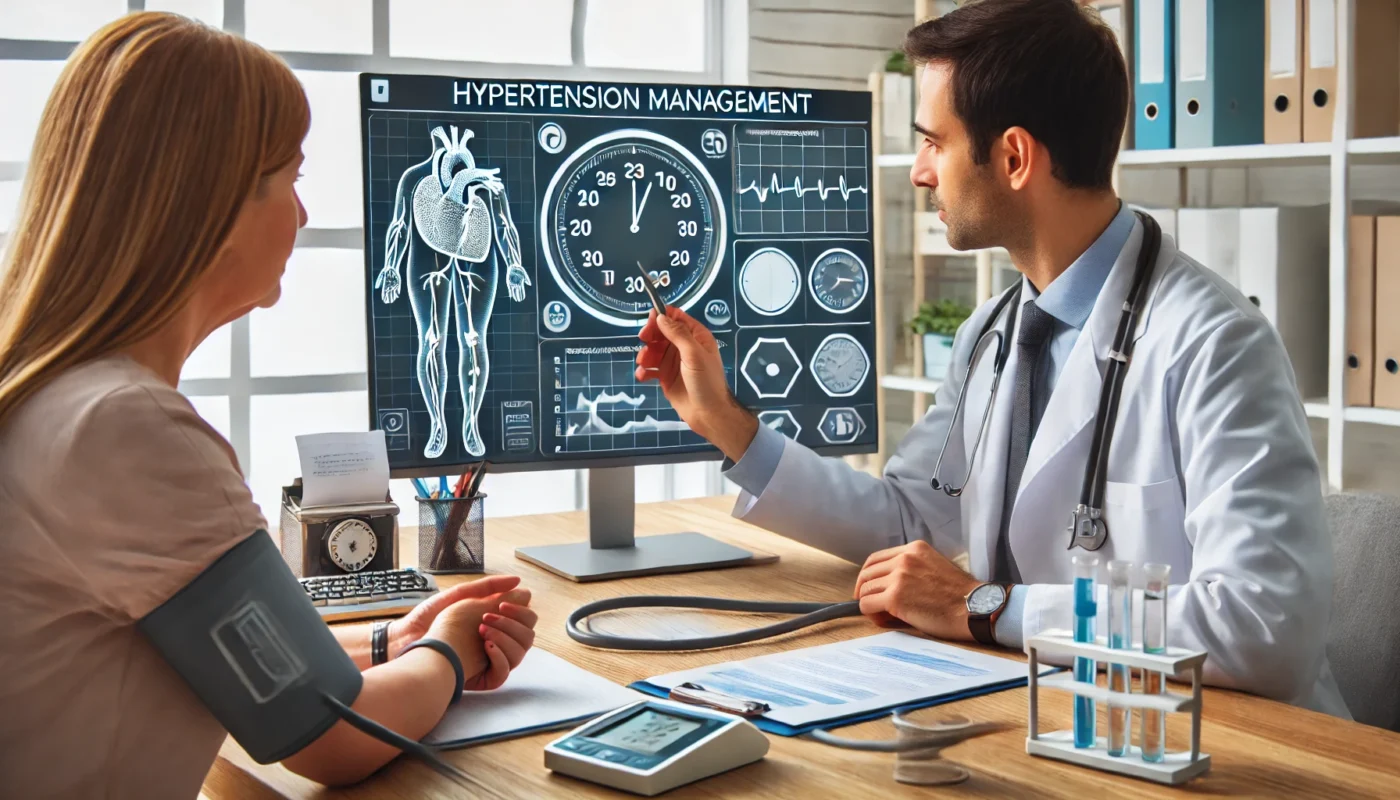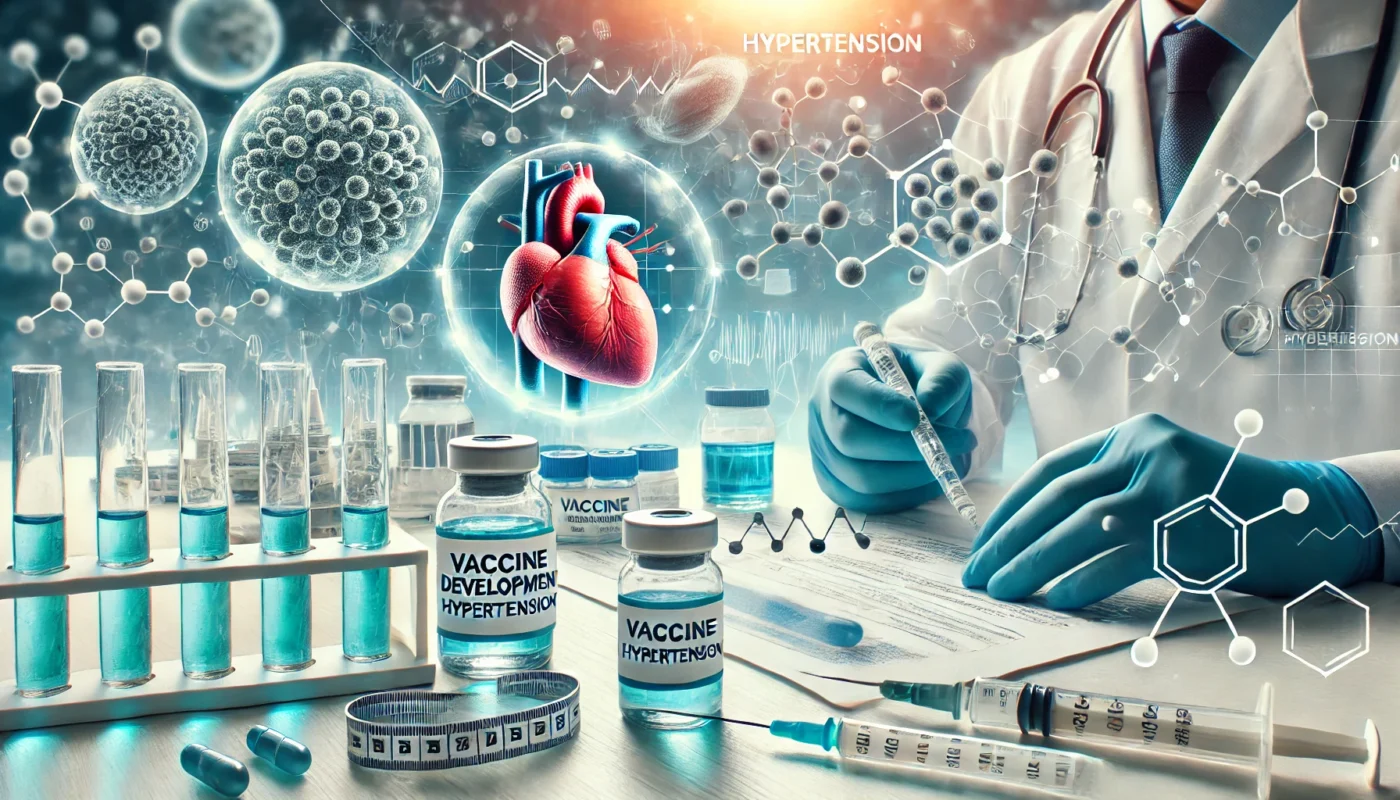Hypertension, or high blood pressure, is a major global health concern, affecting over 1.28 billion people worldwide according to the World Health Organization (WHO). It significantly increases the risk of heart disease, stroke, and kidney failure, leading to millions of preventable deaths annually. Despite advancements in treatment and lifestyle interventions, hypertension remains a challenging condition to manage due to its asymptomatic nature and the lifelong commitment required for adherence to medications. The concept of a vaccine to prevent or manage hypertension has emerged as a groundbreaking idea in medical research, sparking both excitement and skepticism. Could such a vaccine be the future of hypertension management, or is it merely a distant dream?
This article delves into the science behind hypertension vaccines, the progress made in their development, and their potential implications for healthcare.
You May Also Like: The Role of Probiotics in Hypertension Management
Understanding Hypertension and Its Challenges
What Is Hypertension?
Hypertension is a condition where the force of blood against artery walls is consistently too high, typically defined as a systolic blood pressure (SBP) of 130 mmHg or higher or a diastolic blood pressure (DBP) of 80 mmHg or higher. It is often called the “silent killer” because it usually presents no symptoms until significant damage has occurred.
Challenges in Managing Hypertension
- Medication Adherence: Many patients struggle to take antihypertensive medications regularly due to side effects, cost, or forgetfulness.
- Lifestyle Changes: Long-term lifestyle modifications, such as dietary changes and exercise, can be difficult to sustain.
- Global Impact: In low-resource settings, limited access to medications and healthcare exacerbates the problem.
These challenges underscore the need for innovative solutions, such as a hypertension vaccine, to complement existing strategies.
The Science Behind Hypertension Vaccines
What Is a Hypertension Vaccine?
A hypertension vaccine would work by targeting specific mechanisms involved in blood pressure regulation, such as the renin-angiotensin-aldosterone system (RAAS). The RAAS plays a central role in controlling blood pressure by regulating fluid balance and vascular resistance.
Mechanisms of Action
Hypertension vaccines aim to modulate the activity of key components of the RAAS, particularly:
- Angiotensin II: A hormone that constricts blood vessels, increasing blood pressure.
- Renin: An enzyme that triggers the production of angiotensin II.
By targeting these molecules, a vaccine could help maintain blood pressure at normal levels for extended periods, reducing the need for daily medications.

Progress in Hypertension Vaccine Development
Early Research and Animal Studies
Initial research on hypertension vaccines has shown promising results, particularly in animal models:
- Angiotensin II Vaccines: Early studies in rats demonstrated that vaccines targeting angiotensin II reduced blood pressure and protected against hypertension-induced organ damage.
- Renin Vaccines: Vaccines targeting renin have been explored for their potential to disrupt the RAAS and lower blood pressure effectively.
Human Clinical Trials
Several vaccine candidates have progressed to human trials, with mixed outcomes:
1. CYT006-AngQb
Developed by Cytos Biotechnology, CYT006-AngQb was designed to generate antibodies against angiotensin II, thereby reducing its ability to constrict blood vessels.
- Phase I and II Trials: These trials showed that the vaccine produced a sustained reduction in systolic and diastolic blood pressure over several months. However, the effects were modest and not sufficient to replace traditional antihypertensive drugs.
- Challenges: Variability in individual immune responses and the need for booster doses limited its long-term effectiveness.
2. Angiotensin-Converting Enzyme (ACE) Vaccines
ACE inhibitors are a cornerstone of hypertension treatment, and vaccines targeting ACE activity have been explored as a way to achieve similar benefits without daily pills. While animal studies have shown potential, human trials are still in the early stages.
Potential Benefits of Hypertension Vaccines
If successfully developed, hypertension vaccines could revolutionize the management of high blood pressure by addressing several challenges inherent to current treatments:
1. Improved Adherence
Vaccines could eliminate the need for daily medications, improving adherence and reducing the risk of complications associated with missed doses.
2. Long-Term Effects
By providing sustained blood pressure control over months or years, vaccines could reduce the burden of managing hypertension, particularly for patients with complex medication regimens.
3. Cost-Effectiveness
In low-resource settings, a single vaccination could be more cost-effective than a lifetime supply of antihypertensive drugs.
4. Reduced Side Effects
Vaccines may offer a more targeted approach to blood pressure regulation, potentially minimizing the side effects often seen with traditional medications.

Challenges and Limitations
Despite their promise, hypertension vaccines face several hurdles:
1. Variability in Immune Response
Not all individuals respond to vaccines in the same way, and factors such as age, genetics, and underlying health conditions can influence effectiveness.
2. Booster Requirements
Most hypertension vaccines under development require periodic booster doses, which could complicate their implementation.
3. Safety Concerns
Long-term safety is a critical consideration. Vaccines targeting essential biological systems like the RAAS must avoid unintended consequences, such as overly suppressing blood pressure or impairing kidney function.
4. Regulatory and Ethical Issues
The development and approval of a hypertension vaccine will require rigorous testing to ensure its safety and efficacy, which can be time-consuming and costly.

Complementary Hypertension Management
Even if hypertension vaccines become available, they are unlikely to replace existing treatments entirely. Instead, they could be integrated into a broader strategy for managing high blood pressure:
Lifestyle Modifications
Vaccines could complement lifestyle interventions, such as the DASH diet, regular exercise, and stress management, to enhance their effectiveness.
Nutritional Supplements
Certain supplements can support vascular health and blood pressure control alongside vaccination. Below are five evidence-based supplements:
- Magnesium Glycinate: Magnesium promotes blood vessel relaxation and improves endothelial function. A study in Magnesium Research (2016) found that magnesium supplementation reduced systolic blood pressure by 5 mmHg.
- Coenzyme Q10 (CoQ10): CoQ10 reduces oxidative stress and supports heart health. A clinical trial in Hypertension Research (2007) demonstrated that CoQ10 lowered systolic blood pressure by 11 mmHg.
- Omega-3 Fatty Acids: Omega-3s improve vascular function and reduce inflammation. A meta-analysis in Hypertension (2018) reported reductions of 4 mmHg in systolic blood pressure with omega-3 supplementation.
- Hibiscus Extract: Hibiscus enhances nitric oxide production, promoting blood vessel relaxation. Research in The Journal of Nutrition (2010) showed that hibiscus tea reduced systolic blood pressure by 6 mmHg.
- Beetroot Powder: Beetroot increases nitric oxide levels, improving blood flow and reducing vascular resistance. A study in Nutrition Journal (2017) found that beetroot supplementation reduced systolic blood pressure by 4 mmHg.

The Future of Hypertension Vaccines
Emerging Technologies
Advances in biotechnology and immunology are accelerating the development of hypertension vaccines. Technologies such as mRNA vaccines and personalized medicine approaches could improve their safety, efficacy, and accessibility.
Integration with Digital Health
Wearable devices and mobile health platforms could monitor vaccine effectiveness in real-time, enabling personalized adjustments to hypertension management.
Conclusion
Hypertension vaccines represent an exciting frontier in cardiovascular medicine, offering the potential to simplify treatment, improve adherence, and reduce the global burden of high blood pressure. While research has made significant strides, several challenges remain, including variability in immune responses, safety concerns, and the need for booster doses. As the field evolves, hypertension vaccines may become an essential part of a comprehensive strategy that includes lifestyle modifications, medications, and nutritional supplements. Though still in the experimental stage, these vaccines have the potential to revolutionize how we prevent and manage one of the most pervasive health conditions of our time.
References
- Hypertension. (2018). Omega-3 fatty acids and blood pressure control: A meta-analysis. Hypertension. Retrieved from https://www.ahajournals.org
- The Journal of Nutrition. (2010). Hibiscus tea and vascular health. The Journal of Nutrition. Retrieved from https://academic.oup.com
- Magnesium Research. (2016). The role of magnesium in blood pressure regulation. Magnesium Research. Retrieved from https://www.springer.com
- Hypertension Research. (2007). Coenzyme Q10 supplementation and its effects on blood pressure. Hypertension Research. Retrieved from https://www.nature.com/hr
- Nutrition Journal. (2017). The impact of beetroot powder on vascular function. Nutrition Journal. Retrieved from https://www.biomedcentral.com
Key TERMS for this article:
Hypertension, Hypertension Vaccines, Renin-Angiotensin-Aldosterone System (RAAS), Blood Pressure Regulation, Angiotensin II, Adherence, Cardiovascular Health
Relevant and useful TAGS for this article:
Hypertension, Vaccines, RAAS, Blood Pressure, Cardiovascular Disease, Renin, Prophylactic Medicine, Health Innovation, Nutritional Supplements, Personalized Medicine
Important Note: The information contained in this article is for general informational purposes only, and should not be construed as health or medical advice, nor is it intended to diagnose, prevent, treat, or cure any disease or health condition. Before embarking on any diet, fitness regimen, or program of nutritional supplementation, it is advisable to consult your healthcare professional in order to determine its safety and probable efficacy in terms of your individual state of health.
Regarding Nutritional Supplements Or Other Non-Prescription Health Products: If any nutritional supplements or other non-prescription health products are mentioned in the foregoing article, any claims or statements made about them have not been evaluated by the U.S. Food and Drug Administration, and such nutritional supplements or other health products are not intended to diagnose, treat, cure, or prevent any disease.

